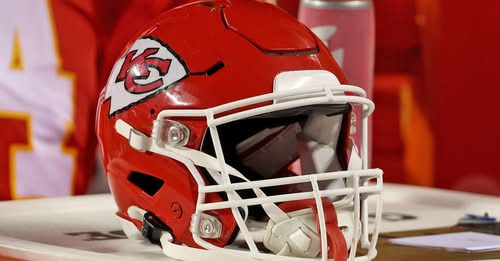Kansas City Mayor Quinton Lucas remains optimistic that the Kansas City Chiefs will stay rooted in Missouri, despite growing interest and overtures from the neighboring state of Kansas. The future location of the team has come into focus following a failed sales tax proposal in Jackson County earlier this year, which had been viewed as a key funding mechanism for renovations to Arrowhead Stadium. With Kansas politicians now actively exploring ways to lure the team across state lines, the debate over the Chiefs’ long-term home has taken on a new urgency.
Mayor Lucas, in recent public statements, has emphasized his confidence in Missouri’s ability to retain its historic NFL franchise. For Lucas, keeping the Chiefs in Kansas City, Missouri, isn’t just about football—it’s about preserving a critical component of the city’s identity, economy, and cultural life. As he sees it, the team and its legacy are interwoven with the community, and any potential move would be a significant loss not just for the city but for the entire state.
The offer from Kansas includes proposed legislation that would enable the state to use STAR bonds (Sales Tax and Revenue) as part of a package to fund a new stadium and infrastructure improvements. These bonds allow the state to use future tax revenues generated by a project to finance the cost of construction. Kansas lawmakers argue this approach wouldn’t create a burden on taxpayers and could provide the Chiefs with a modern, cutting-edge stadium complex that rivals some of the newest venues in the NFL.
While the offer is still in the proposal stage, it signals serious interest and intent from Kansas officials to make the Chiefs their own. In response, Missouri leaders have reiterated their desire to work with the Chiefs on a long-term stadium solution, though consensus on funding remains elusive. This political back-and-forth is playing out against a backdrop of rising stadium costs, shifting league dynamics, and a fan base that spans both sides of the Missouri-Kansas border.
Mayor Lucas has underscored that the dialogue with the Chiefs is ongoing and constructive. He notes that while the failed tax measure was a setback, it does not mark the end of negotiations. Instead, it opens the door for more creative solutions, possibly including private investment, revised public funding mechanisms, or a new bond proposal. He also believes the Chiefs have strong incentives to remain where they are, citing long-standing community ties, tradition, and a loyal regional fan base.
The Chiefs have played in Kansas City, Missouri, since 1963, when they relocated from Dallas and became a cornerstone of the city’s sports identity. Arrowhead Stadium, their home since 1972, is one of the most iconic venues in the NFL, known for its raucous atmosphere and the deafening roar of the crowd. Though older than many NFL stadiums, Arrowhead has remained competitive due to periodic renovations, including a major overhaul in 2010. However, as more franchises build state-of-the-art facilities with enhanced luxury seating, retail space, and entertainment districts, the pressure is mounting on the Chiefs to modernize or risk falling behind.
From a business standpoint, stadiums are no longer just about seating capacity or sightlines—they’re about year-round revenue streams. Owners and investors seek to maximize profitability through real estate development, naming rights, and non-game-day events. In that context, Kansas’ offer to finance a new stadium could be tempting, especially if it includes space for restaurants, hotels, and retail. Kansas officials have hinted at locating the potential new stadium in Wyandotte County, near the existing Kansas Speedway and Legends Outlets, creating a sports and entertainment hub that could rival other NFL megaplexes.
Still, the emotional and historical pull of Arrowhead cannot be discounted. Fans have voiced strong opinions on social media, with many expressing dismay at the idea of the team leaving Missouri. While some see a potential move to Kansas as merely a shift of a few miles, others see it as a betrayal of tradition and community loyalty. The Chiefs’ brand is deeply associated with Kansas City, Missouri, even if their fan base covers the wider region. Moving the team—even a short distance—could provoke backlash from longtime supporters and destabilize the strong civic bond between the franchise and its home city.
Mayor Lucas has been careful to acknowledge these sentiments while maintaining a pragmatic stance. He knows the economic realities of modern sports franchises but also believes that Missouri has the tools to remain competitive. He’s urged state lawmakers and local officials to come to the table with workable solutions and stressed the importance of unity and strategy in future negotiations. Lucas has also pointed out that keeping both the Chiefs and the Royals, who are also considering stadium options, is about more than civic pride—it’s about jobs, development, and regional growth.
In addition to economic concerns, there are logistical and legal challenges involved in any relocation. Even if Kansas lawmakers pass the necessary funding and tax legislation, there would be environmental reviews, infrastructure planning, and likely, some legal opposition. Any move would take years to execute, during which time negotiations with Missouri could continue. That timeline gives city and state officials in Missouri breathing room to refine their pitch and work with the Chiefs organization toward a mutually beneficial solution.
Privately, many believe the Chiefs are using Kansas’ offer as leverage to get a better deal from Missouri. This is a common tactic in professional sports, where teams pit cities and states against each other to extract the best financial terms. While such a strategy may seem cynical, it’s also part of the broader economic landscape of stadium negotiations. The Chiefs, for their part, have not made any definitive statements about relocating but have said they are exploring all options to secure the franchise’s long-term future.
Mayor Lucas continues to project confidence, stating that he believes a deal will eventually be reached to keep the team in Missouri. He has praised the Hunt family, which owns the Chiefs, for their ongoing engagement and commitment to the region. According to Lucas, both sides are aware of what is at stake and are working in good faith. He also stressed the need for transparency and public involvement, noting that any stadium deal must be fair, accountable, and in the public interest.
One of the key sticking points in future negotiations may be the division of costs. Voters rejected the earlier proposal largely because of concerns about public money being used for a private sports facility. If a new deal is to gain traction, it will likely require a mix of private funding, revised tax instruments, and possibly a more targeted voter campaign to win approval. Lucas has hinted that future proposals may come with more detailed economic projections and community benefits to address voter skepticism.
Ultimately, the future of the Chiefs in Missouri may come down to how both sides define partnership. If city and state officials can demonstrate that keeping the team in Missouri is not just a sports issue but a broader economic and cultural investment, they may be able to craft a compelling case for public support. Conversely, if the debate becomes bogged down in politics and division, Kansas’ offer may begin to look more attractive.
As of now, no final decisions have been made, and negotiations are expected to continue well into the next year. Mayor Lucas remains a central figure in these discussions, offering a steady voice and clear vision for what he believes is best for Kansas City. While challenges remain, his message is one of hope and resilience. The Chiefs may have options, but so does Missouri—and Lucas is determined to make sure the team’s future includes the city that has embraced it for over six decades.



